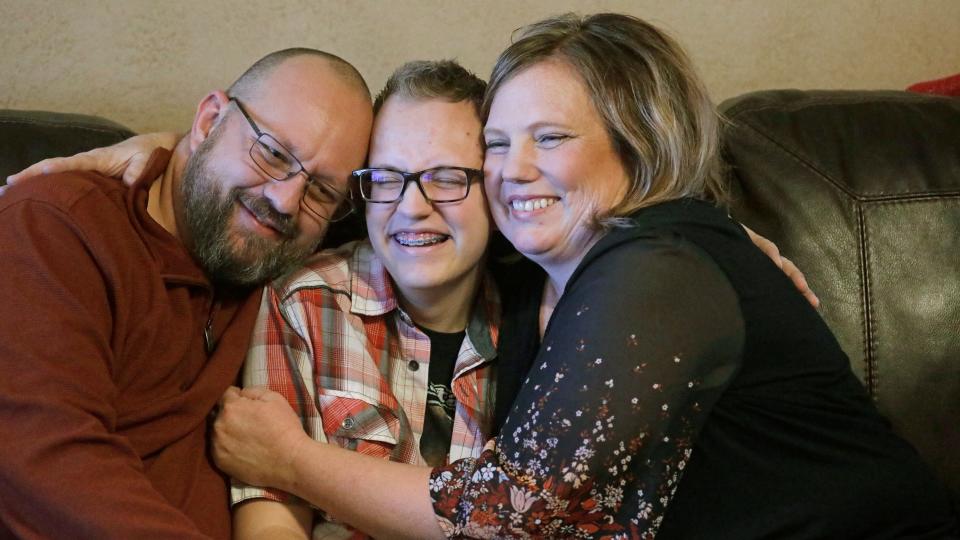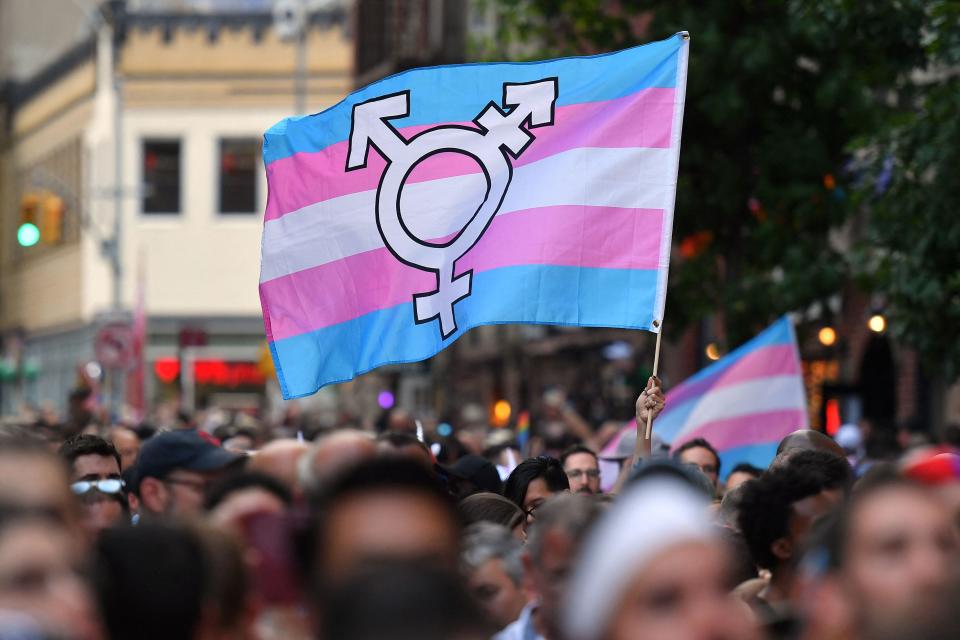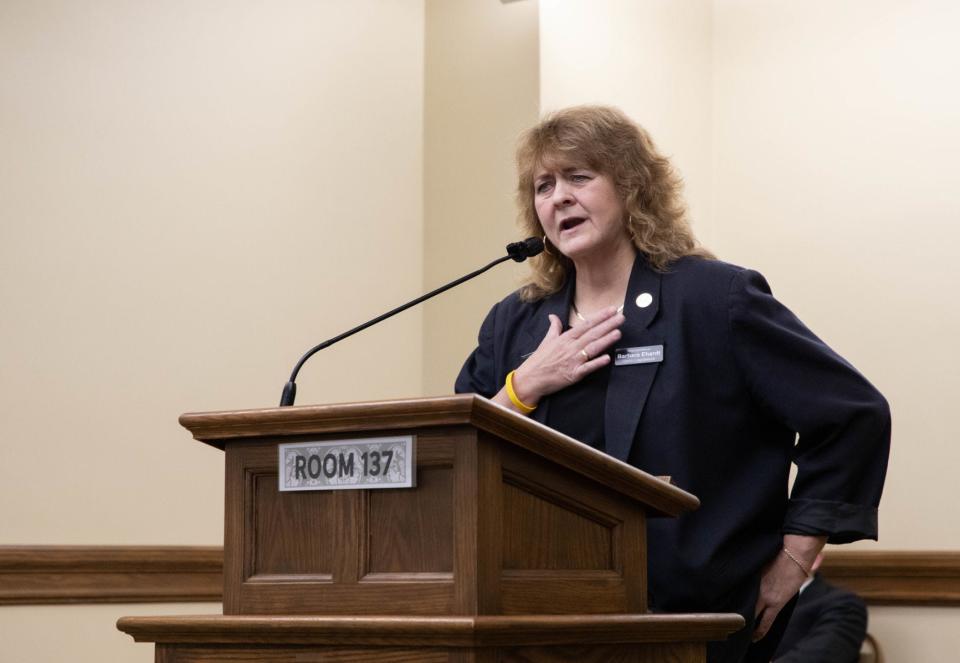Transgender children who get hormone therapy enjoy better mental health, study says
Transgender people who start gender-affirming hormone treatment in adolescence experience better mental health than those who wait until adulthood, according to a new study.
Authors of the study led by the Stanford University School of Medicine said the results illustrate the benefits of allowing youth to pursue transgender medical care at a time when such treatment is being targeted by some conservative lawmakers.
“This study is particularly relevant now because many state legislatures are introducing bills that would outlaw this kind of care for transgender youth,” said lead author Jack Turban, a postdoctoral scholar in pediatric and adolescent psychiatry at Stanford Medicine. “The results suggest that this type of legislation is extremely dangerous.”
The study, published this week in the Public Library of Science’s online journal, found that individuals who began hormone treatment in adolescence were less likely to experience suicidal thoughts, major mental health disorders or issues of substance abuse.
It also found that among transgender individuals who wanted hormone treatment, those who got it enjoyed better mental health than those who didn’t, regardless of age.
“It is not surprising to see that the evidence confirms that providing youth with gender-affirming care is clinically sound and the most effective way to alleviate symptoms of gender dysphoria,” said D. Ojeda, policy advocate for the National Center for Transgender Equality, a Washington, D.C.-based advocacy group whose nationwide survey provided the basis for the study.

Gender dysphoria, which is discomfort or distress caused by the discrepancy between a person’s gender identity and sex assigned at birth, can cause anxiety and depression when left untreated, Ojeda said.
Gender-affirming treatment addresses this by using either estrogen or testosterone to physically change a person’s body to fit their sense of identity. In adolescence, it can enable youths to experience puberty in the same way.
Sean Ebony Coleman, founder and executive director of Destination Tomorrow, an LGTBQ+ center in New York City’s Bronx borough, said the study results confirm what he sees in his day-to-day observations.
“You have to look at the level of anxiety that young people walk around with, especially when they’re dealing with gender identity,” Coleman said. “They’re almost feeling like they have to perform to meet others’ beliefs of what their lives should be.”
Fewer suicidal thoughts, incidents of psychological distress
Guidelines proposed in December by a group of transgender health experts advise that youth should receive more preparation and psychological assessment than adults, saying they must have grappled with their gender identity for “several years” before undergoing drug treatment or surgery.
Turban noted that the current standard of care calls for transgender youth to work with a mental health professional if they are considering gender-affirming treatment.
While research had been done on the mental health of transgender youth before or after starting such treatment, he said, no one had previously compared those who started during adolescence to those who did so as adults.
“This is the first study to explicitly show that not being able to access hormones until adulthood is linked to worse mental health outcomes,” he said.

The study gleaned data from the National Center for Transgender Equality’s 2015 U.S. Transgender Survey, the largest ever such poll of transgender adults nationwide. More than 27,000 people completed the survey, answering extensive questions about their lives.
Turban, along with senior author Alex Keuroghlian, an associate psychiatry professor at Harvard Medical School, focused on responses from more than 21,000 survey participants who indicated they wanted or had had gender-affirming treatment. They analyzed responses based on when respondents began receiving hormone therapy – whether in early or late adolescence, adulthood or not at all.
Respondents were asked about their mental health and history of suicidal thoughts, suicide attempts, binge drinking and illicit drug use, as well as about any recent instances of severe psychological distress.
Compared with respondents who had not received treatment, those who did were less likely to have experienced recent suicidal ideation or distress, the researchers found. For respondents who had begun gender-affirming treatment in early adolescence, the odds of experiencing psychological distress were reduced by 222%; for those in late adolescence, 153%; and for those in adulthood, 81%.
Likewise, odds of suicidal ideation were similarly lower for those who had started in early adolescence (135%) compared with late adolescence (62%) and adulthood (21%).
Those who began receiving gender-affirming treatment in adolescence were less likely to have used illicit drugs than those who started treatment as adults, the study found.

Researchers also found that those who began hormone therapy in adulthood were more likely to engage in binge drinking and illicit drug use than those who never got hormone treatment at all. Turban said heightened confidence and social engagement among those receiving hormones might be a factor in that phenomenon, indicating a need to tailor substance abuse counseling to transgender individuals.
Transgender medical care 'saves lives' but can be hard to find
While some transgender people are comfortable in their bodies and don’t want to seek out hormone therapy, those who do often encounter a lack of pediatric gender clinics or physicians trained to care for gender diverse youth.
“Comprehensive training in gender-affirming care is currently not part of standard medical education curricula,” said Harvard’s Keuroghlian, principal investigator for the National LGBTQIA+ Health Education Center at The Fenway Institute in Boston.
Additionally, state legislatures nationwide have mulled dozens of bills prohibiting transgender health care for youth in recent years, and two – Arkansas and Tennessee – have passed them so far. Similar bills have already been introduced in 2022, with proponents arguing that such laws are necessary to protect youngsters from life-altering and permanent changes that they are too young to fully understand and might come to regret.
Such legislation has been largely opposed by medical professionals, including the American Medical Association and American Psychiatric Association.
“Providing access to gender-affirming care to adolescents has unquestioned benefits,” said Paula Neira of GLMA: Health Professionals Advancing LGBTQ Equality.
Neira, a nurse who also serves as clinical program director for the Center for Transgender Health at Johns Hopkins Medicine in Baltimore, said laws targeting adolescent hormone treatment “aren’t grounded in science and best practices. They’re designed to play to people’s fears and ignorance.”

A majority of transgender and binary youth say debate over such laws has negatively impacted their mental health, according to poll results also released this week by the Trevor Project, a national suicide prevention organization serving LGBTQ youth.
That poll, conducted in late 2021, surveyed a national sample of 820 LGBTQ youth and young adults aged 13 to 24. Of the 318 who were transgender or nonbinary, 85% reported negative mental health impacts over such bills, including those banning transgender athletes from sports teams that match their gender identity.
Several states, including Arizona and Kentucky, have introduced bills targeting gender-affirming treatment for youths for the 2022 legislative session.
Turban said study researchers are working with the National Center for Transgender Equality as the agency conducts its 2022 survey.
“Gender-affirming care saves lives,” said Ojeda, of the center. “It’s time for policymakers and health care leaders to follow the science, because kids deserve better.”
This article originally appeared on USA TODAY: Transgender hormone therapy: Early start helps mental health for kids

 money
money 